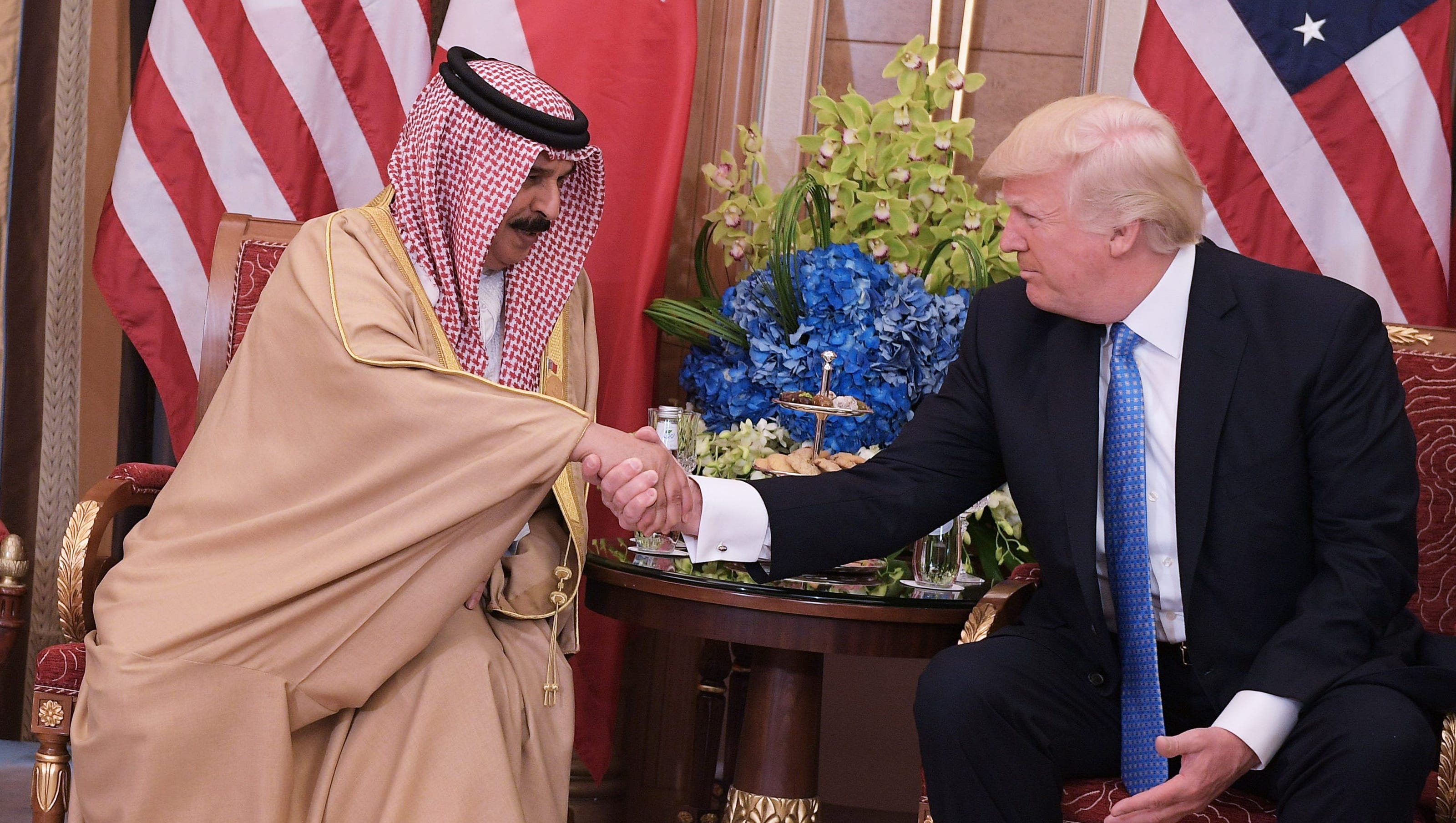Analyzing Trump's "Bromance" With Arab Leaders

Table of Contents
Economic Factors Driving the Trump-Arab Leader Relationship
The economic underpinnings of the Trump administration's approach to the Arab world were substantial and multifaceted, significantly shaping the nature of the "bromance."
Arms Deals and Military Cooperation
Massive arms deals characterized the Trump-Arab leader relationship. The US defense industry benefited enormously, while the strategic landscape of the Middle East was dramatically altered. Saudi Arabia and the UAE, in particular, became significant purchasers of American military equipment. These agreements not only boosted the US economy but also solidified strategic alliances, creating dependencies that influenced regional power dynamics.
- Example 1: The $110 billion arms deal with Saudi Arabia included advanced fighter jets, missile defense systems, and other military hardware. This deal involved major defense contractors like Lockheed Martin and Raytheon.
- Example 2: The UAE's purchases of F-35 fighter jets and other sophisticated weaponry signaled a deepening strategic partnership with the US.
- Lobbying and Political Contributions: The influence of lobbying groups representing defense contractors played a significant role in shaping the administration's policies towards arms sales to Arab nations. Political contributions from these groups also likely contributed to the favorable environment for these deals.
Energy Security and Investments
Energy security was another crucial driver of the Trump-Arab leader relationship. The Middle East remains a vital source of oil for the global economy, and the Trump administration prioritized maintaining strong ties with major oil-producing nations. This involved not just maintaining stable oil supplies but also securing investments from Arab nations in US infrastructure and businesses.
- Oil Imports: While the US has become increasingly energy independent, it still relies on Middle Eastern oil imports to a significant degree. Maintaining access to these resources was a key consideration in shaping US foreign policy.
- Investment Figures: Significant investments flowed from Saudi Arabia and other Gulf states into US companies and infrastructure projects, strengthening economic ties and creating mutual dependencies. While the exact figures are often opaque, the scale of these investments is undeniable.
- Key Business Deals: Numerous significant business deals between US and Arab companies were facilitated or encouraged during this period, further strengthening the economic relationship.
Strategic Alliances and Shared Geopolitical Goals
Beyond economic factors, shared strategic interests and geopolitical goals were pivotal in shaping the Trump-Arab leader relationship.
Counter-terrorism and Regional Stability
The fight against terrorism emerged as a key area of collaboration. Both the Trump administration and many Arab nations faced the threat of ISIS and other extremist groups. This shared concern led to cooperation in intelligence sharing, joint military operations, and counter-terrorism strategies. However, these efforts were not without their limitations and challenges, including differing approaches to regional conflicts.
- Joint Military Operations: Several joint military operations, particularly in the fight against ISIS, demonstrated the degree of military cooperation between the US and several Arab nations.
- Intelligence Sharing Agreements: Formal and informal intelligence-sharing agreements facilitated better coordination in combating terrorism and other threats.
- Challenges and Limitations: Despite cooperation, disagreements persisted over the tactics and long-term strategies for regional stability, highlighting the complexities of the alliances.
Iran and the Nuclear Deal
Trump's controversial withdrawal from the Iran nuclear deal significantly influenced his relationship with Arab nations. Many Arab leaders shared concerns about Iran's nuclear ambitions and regional influence, viewing a more confrontational US approach towards Iran as beneficial to their interests. This shared concern helped to strengthen alliances against a common adversary.
- Withdrawal from the Iran Nuclear Deal: Trump's decision to withdraw from the Joint Comprehensive Plan of Action (JCPOA) resonated strongly with several Arab leaders who saw Iran as a significant threat.
- Iran's Regional Influence: The shared concern over Iran's growing influence in the region solidified the US-Arab alliance.
- Geopolitical Shifts: The withdrawal from the JCPOA led to increased tensions with Iran, altering the geopolitical landscape of the Middle East.
Ideological Alignment and Personal Chemistry
The Trump-Arab leader relationship also involved ideological alignment and a notable level of personal chemistry between Trump and some key leaders.
Populist Appeals and Shared Authoritarianism
Similarities in political style between Trump's populist approach and the authoritarian tendencies of some Arab regimes played a role. Both Trump's rhetoric and the actions of some Arab leaders resonated with certain segments of their respective populations, leading to a shared understanding, albeit one criticized for its implications for human rights and democratic principles.
- Populist Rhetoric: Trump's populist appeal and nationalist rhetoric found common ground with the nationalistic sentiments promoted by certain Arab leaders.
- Authoritarian Tendencies: The shared, often criticized, tendency toward authoritarian governance fostered a sense of mutual understanding between some leaders.
- Human Rights Concerns: This alignment, however, drew significant criticism from human rights organizations and activists, raising concerns about the implications of such an alliance for democratic principles.
Personal Relationships and Diplomacy
Personal relationships and chemistry significantly impacted the interactions between Trump and certain Arab leaders. While personal diplomacy can be effective, relying on it exclusively carries risks in international relations.
- Personal Interactions: Reports suggest a significant degree of personal rapport between Trump and certain Arab leaders, contributing to the "bromance" narrative.
- Influence on Foreign Policy: These relationships directly impacted the shaping of foreign policy decisions.
- Risks and Limitations: Reliance on personal chemistry alone is not a sustainable foundation for long-term foreign policy; this was a significant weakness of this relationship.
Conclusion
Trump's relationship with Arab leaders, often described as a "bromance," was a complex interplay of economic interests, shared strategic goals, and personal chemistry. While seemingly productive in terms of arms deals and counter-terrorism efforts, this relationship raised critical concerns about human rights and long-term regional stability. Understanding this nuanced relationship is crucial for analyzing US foreign policy in the Middle East. Further research into the specifics of agreements and the long-term consequences of this unique political dynamic is essential for a complete understanding of the Trump Arab Leaders Relationship. Continue exploring this complex relationship by researching further articles on the Trump Arab Leaders Relationship.

Featured Posts
-
 Giants Vs Mariners Key Injuries Impacting The Series April 4 6
May 17, 2025
Giants Vs Mariners Key Injuries Impacting The Series April 4 6
May 17, 2025 -
 Tim Hardaway Jr Shot Crew Chief Admits Referee Error In Pistons Loss
May 17, 2025
Tim Hardaway Jr Shot Crew Chief Admits Referee Error In Pistons Loss
May 17, 2025 -
 Josh Cavallos Legacy Fighting For Lgbtq Inclusion In Sport
May 17, 2025
Josh Cavallos Legacy Fighting For Lgbtq Inclusion In Sport
May 17, 2025 -
 How Jalen Brunsons Injury Impacts The New York Knicks Season
May 17, 2025
How Jalen Brunsons Injury Impacts The New York Knicks Season
May 17, 2025 -
 Tom Thibodeaus Praise For St Johns Success A New York Knicks Perspective
May 17, 2025
Tom Thibodeaus Praise For St Johns Success A New York Knicks Perspective
May 17, 2025
